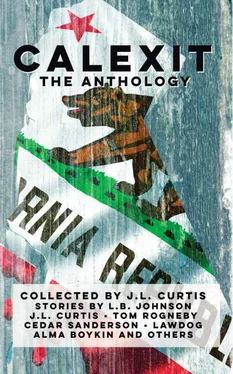The sound continued towards her as she struggled to make out what it was, with a strained, listening attention. If it was Militia, and more than one of them, she was done, as she would likely take a bullet before she could get the second shot off. Better that than to be wounded, and then raped and left to die, things she’d heard from her neighbor had happened down in the cities when families tried to escape.
From the trees, a flock of birds took to the sky with a loud cry as a man came into view. He was wearing jeans and a flannel shirt, not the garb of any organized group but Lisa threw herself into the posture of a lunging fencer, aiming the revolver at his chest.
He slowly drew a small knife, holding it out to her, and gave her a grin saying “Miss, I think you won.”
“What are you doing out here?” she says as he lowers the knife, stepping back from her slowly as she had done when she met the bear.
“I live in a small cabin up on the next ridge line. I was hunting for mushrooms as I’m getting low on meat and haven’t seen much game in the last couple of weeks. I mean you no harm, but if you have any extra food it would be appreciated.”
She looked into his eyes as a sailor might look at the sea, a watchful gaze that tries to see into what could be friend or adversary, making a decision on which a life depends as to the force and direction of nature’s thrust if it chooses to attack.
She lowers her revolver and reaches into her saddle bag for a handful of protein bars.
She looks at the man and says, “I have very little but I will share what I have. I’m going to toss them to the side of the trail, please step off the trail and let me pass before you pick them up. If you don’t, please remember I have a firearm.”
“Thank you.” he says with eyes that were twenty years older than his form, as she carefully walks Taxi past him as she continues up the trail.
* * *
That night, as she lay in her sleeping bag, her food supplies high up in a tree downwind of her camp and Taxi happily munching on some fresh grass, she realizes how close she came to shooting him. She prays he is okay as she realizes how much she has missed seeing other people. She is normally happier alone. She had found few people in her life that can be content with time alone like she does, most preferring the excitement of crowds, the adulation of the unknown, look at me, watch me, head towards the lights and the noise. That was not for her. She can’t find peace in that, though it haunts the edges of it, as if it almost knows what it is like, but can’t give in to it. The peace isn’t just the silence, it’s not the trees or the animals or the water. It’s all the senses wrapped up in one as she breathes it in deep from the musty confines of a sleeping bag as she lies under the stars. That smell that has a color to her, almost green, not the longing green of envy or the gray-green of aromatic herbs, but the green of clarity, a smell that makes her weak for childhood, when every morning came with this sense of freedom and purity.
She is ready now to find others like herself, and hope they will offer her a welcome.
A day and a half later, she’s within a few miles of what she believes is the Nevada border, there is still one road nearby that she will get closer to than she wishes as she travels those last miles, but in the early morning dim light, she knew she would continue. Stars still glinted overhead as the sun rose ahead of her.
She is going to continue heading downhill and east to American soil or die trying. California was her home but her roots are rooted deep in the freedom of American soil and one way or another, she would return to it.
By mid-morning on day three, she was in the high desert, few trees to shield her, making sure she stayed well away from the road. At one point, she came to a rough barbed wire fence, one built for cattle, of which she saw none in sight. Having no other option, she got her ax and chopped out an opening big enough for them to pass through. In the far distance was a small house. As she approached it a young man, a teen really, looked at her, probably surprised to see an attractive but very dirty redhead on a horse in his yard, even as he had a shotgun at his side.
“Miss?” he said.
Lisa replied, “Where am I?”
He said, “You are a mile from Hot Springs, Nevada. Reno’s just over the hills there.” Looking at her with eyes full of concern, not of fear he said, “You’re not the first person to escape Cali this way; if you need transportation into town my dad is the Sheriff and he will take you someplace safe. I’ll take care of your horse until you know what you want to do. Welcome back to the United States Miss.” She could do nothing but cry. She should have been lost in wonderment, but like people in fairy tales where everything seems to work out in the end (unless you are the witch) she was too exhausted to be astonished.
She simply got off of her horse, laid down her weapons on the ground and hugged him, looking at their family truck in the driveway as Cinderella probably looked at that pumpkin coach, never doubting that it was real.
The Farm
Eaton Rapids Joe
Moonbeam signed a sweeping set of legislation into law on his first day of office.
He spearheaded the drive for a new form of government for Cali in the latest election and was rewarded by a 65% margin of victory over his closest rival. Support was largest in urban centers and in affluent suburban areas. Support from rural areas was tepid at best.
The key points of the new platform included completely decoupling from the United States economy, rapidly transitioning to a “sustainable, low-carbon” economy and providing “justice for the oppressed”. Lastly, but most importantly, was setting up a new parliamentary government.
Pursuant to those points, Cali issued its own currency, the ‘Callor’ which was initially pegged at 1.35 dollars-to-the-Callor.
Wages were frozen so every worker received a 35% pay raise. Universal Basic Income was granted to all residents who were willing to submit fingerprints, retina scans, a DNA sample and accept an RFID implant. All bank accounts and assets were reduced by 26% to transition existing dollars to Callors.
Other actions included a tax on the surface area of all roofs commensurate with the income tax that would be collected if they were covered with solar panels with the power feeding back into the grid at retail rates.
To boost employment and to save the environment, all synthetic herbicides and pesticides were banned. The think-tanks at UC Davis calculated that hand weeding and manual methods of pest control would provide employment for more than six million workers.
Military bases were leased to the Chinese for a five-year period after which they would be absorbed by Cali. The rent was paid in an undisclosed amount of gold, which Cali used to buy access to Colorado River water for the duration. Environmentalists calculated that the solar panels on roofs would provide enough electricity to desalinate the equivalent amount of water in five years.
What could go wrong?
Five years later…
Chad looked up from the post hole he was digging as the sound of footsteps approached him. Some things never change in farming. There are never enough fence posts, gates, hoses, or hours in the day.
It was Miguel. He was not surprised. Miguel was the oldest student in his crew of ten. Cali mandated twenty-six years of compulsory education. Starting at age sixteen, academic underperformers (problem students), were shunted into work crews to educate them.
As a farmer, Chad was forced to take twelve students every growing season. He was allowed to return two of them. Chad had spent four years in the military and was familiar with all of the games.. He quickly figured out which two were likeliest to give him problems and wasted no time getting them off his farm. The sooner they were gone, the sooner everybody else settled down and got to business.
Читать дальше










